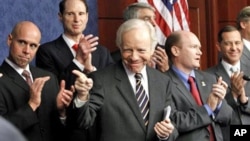There are now enough votes in the U.S. Senate to proceed on a bill that would end America's ban on openly-gay military service. So says a senator who advocates repealing "Don't Ask, Don't Tell" - a law that allows homosexuals to serve in the armed forces only if their sexuality remains secret. But it is unclear whether there is enough time for the Senate to debate and vote on the matter in a brief, end-of-year session.
Perhaps no U.S. legislative initiative has seen more ups and downs this year than the effort to end "Don't Ask, Don't Tell," a law that has led to the expulsion of 14,000 gay military personnel since its enactment in 1993.
In January, President Barack Obama announced he would press for repeal of the law. Soon after, Defense Secretary Robert Gates and the Chairman of the Joint Chiefs of Staff, Admiral Mike Mullen, said they, too, believed the ban on openly-gay military service should end.
The Pentagon ordered an exhaustive study to gauge military attitudes toward a change in policy, and how to implement that change without harming morale or combat effectiveness in a time of war.
Meanwhile, a provision to repeal "Don't Ask, Don't Tell" was attached to an annual U.S. defense spending bill. The bill passed in the House of Representatives, but stalled in the Senate, where Republicans used a parliamentary maneuver to block debate on the legislation.
With time running out for action this year, and Republicans increasing their numbers in the Senate beginning next year, proponents of repeal openly fretted that the best chance to end "Don't Ask, Don't Tell" may have slipped by.
Not so, according to independent Democratic Senator Joe Lieberman of Connecticut at a news conference last week.
"I am confident we have more than 60 votes prepared to take up the Defense Authorization bill with the repeal of 'Don't Ask, Don't Tell'. And we are going to keep fighting in the spirit of the American military, until we get the job done."
In addition to nearly all Democrats, Lieberman said he had a commitment from two Republican senators, Susan Collins of Maine and Richard Lugar of Indiana, to vote to proceed on the bill, as long as debate on the measure is full and open.
Shortly thereafter, reports surfaced that two other Republicans, Lisa Murkowski of Alaska and John Ensign of Nevada, were also prepared to vote for repeal if the Pentagon study concluded it could be done with a minimum of disruption to the military.
The study is to be released December 1, but details of a draft copy were leaked to The Washington Post newspaper. The study reportedly concludes "Don't Ask, Don't Tell" can be abolished with little or no impact on military effectiveness, and that 70 percent of U.S. troops have few if any objections to serving alongside openly gay soldiers.
Now the question becomes whether the Senate can act in the waning weeks of 2010.
Democratic Senator Barbara Boxer of California says the ban must end.
"We have got to move toward equality or we lose the essence of our nation. And this vote is about moving toward equality. People are fighting for our country. And for absolutely no reason, they find themselves tossed out of the military -- no reason that has anything to do with their ability to fight and defend this nation," says Boxer.
But not everyone is convinced the policy should change. Republican Senator John McCain of Arizona says the Pentagon study is flawed because its primary purpose was to examine how best to implement repeal of "Don't Ask, Don't Tell" -- not whether the law should or should not be abolished.
"I want a thorough and complete study of the effect [of repeal] on morale and battle effectiveness of the United States military. I will listen, as I have said for years, to our military leaders, and not to a study that is leaked [to the press]."
McCain was speaking on NBC's Meet the Press program, where he said Congress should hold hearings to determine whether the Pentagon study adequately addresses all issues related to repealing the ban on openly-gay military service.
Nearly all of America's NATO allies allow homosexuals to serve openly. Nations that do not permit the practice include Cuba, Syria, Iran, and North Korea. Recent public opinion polls show a clear majority of Americans favor ending "Don't Ask, Don't Tell.”
US Senator Says Votes Exist to End ‘Don't Ask, Don't Tell’




